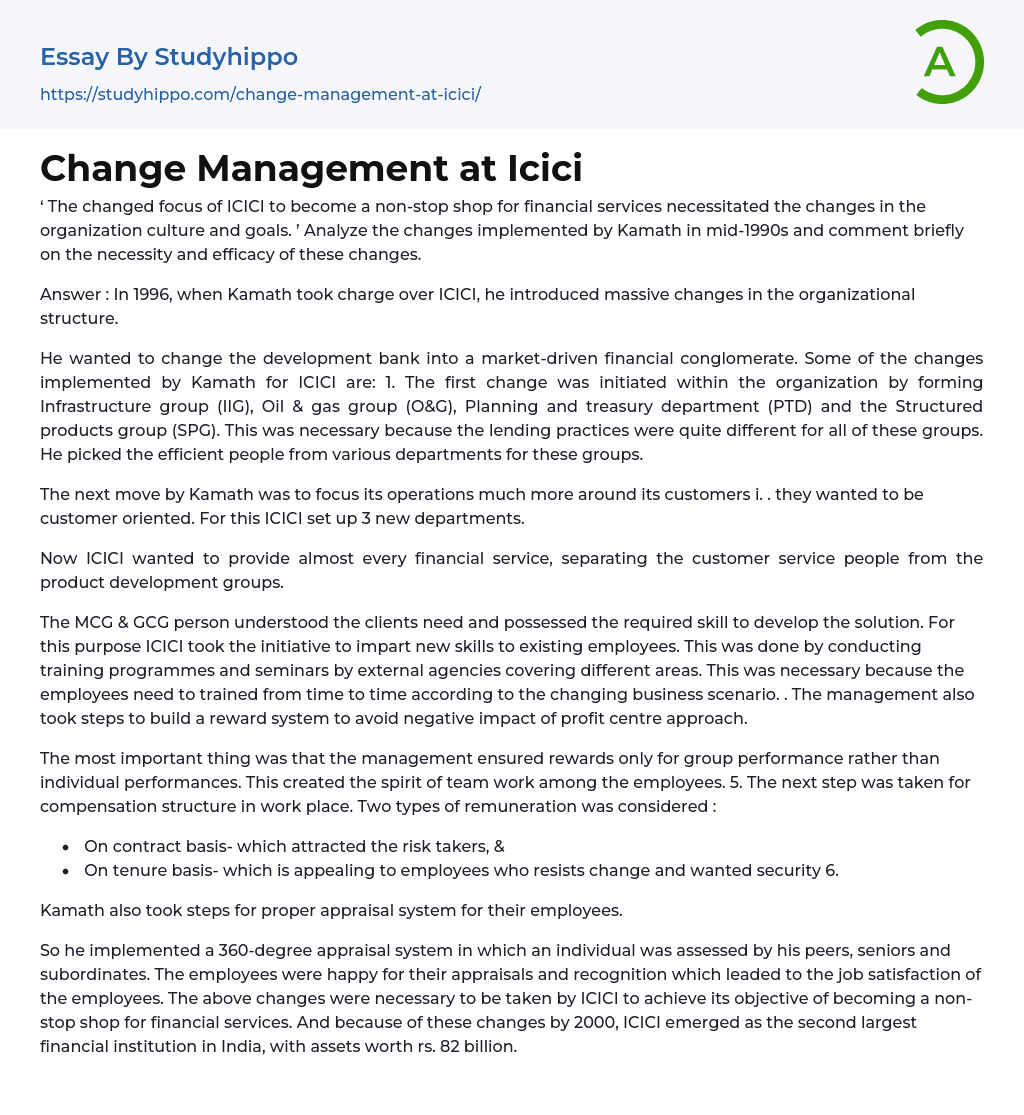‘The shift in focus of ICICI to become a one-stop destination for financial services called for changes in the culture and objectives of the organization.’ Kamath implemented significant alterations in the organizational structure when he assumed control over ICICI in 1996.
He aimed to transform the development bank into a financially-driven conglomerate. Kamath implemented several changes for ICICI, including the creation of specific groups within the organization such as Infrastructure group (IIG), Oil & gas group (O&G), Planning and treasury department (PTD), and the Structured products group (SPG) in order to cater to the diverse lending practices within each group. He handpicked capable individuals from different departments to lead these groups.
Kamath's next step was to shift the company's focus towards its customers, aiming to be customer-oriented. In order to achieve this, ICICI established three new departments.
...The goal of ICICI was to offer a wide range of financial services, therefore separating the customer service staff from the product development teams. The individuals in MCG & GCG divisions possessed both an understanding of the clients' needs and the necessary skills to develop suitable solutions.
In order to achieve this objective, ICICI took the initiative to provide new skills training to its current employees. This was accomplished by organizing training programs and seminars conducted by external agencies that focused on various areas. This was deemed necessary due to the need for ongoing employee training to adapt to the changing business environment. Additionally, the management implemented a reward system to mitigate any negative effects resulting from a profit center approach. Crucially, the management ensured that rewards were based on group performance rather than individual performance.
This instilled a sense o
teamwork among the employees. 5. Afterward, the compensation structure in the workplace was addressed. Two types of remuneration were considered:
- For those who were willing to take risks, a contract basis was offered,
- For employees who preferred security and resisted change, a tenure basis was provided 6.
Kamath also implemented an effective appraisal system for the employees. This involved a 360-degree appraisal system, where individuals were assessed by their peers, superiors, and subordinates. The employees were pleased with their appraisals and recognition, which contributed to their job satisfaction.
ICICI had to make the aforementioned changes in order to accomplish its goal of becoming a one-stop destination for financial services. These changes ultimately led to ICICI becoming the second largest financial institution in India by 2000, with assets valued at rs. 82 billion.
- Adaptation essays
- Adventure essays
- Adversity essays
- Aging essays
- Alcohol essays
- Barbie Doll essays
- Beauty essays
- Care essays
- Carpe diem essays
- Change essays
- Chess essays
- Chicken essays
- Choices essays
- Contrast essays
- Crops essays
- Development essays
- Dream essays
- Evil essays
- Experience essays
- Family essays
- Farm essays
- Fire essays
- First Love essays
- Focus essays
- Greed essays
- Hero essays
- Holiday essays
- House essays
- Housing essays
- Humility essays
- Humor essays
- Hypocrisy essays
- Integrity essays
- Law of Life essays
- Life Changing Experience essays
- Life Experience essays
- Lifestyle essays
- Limitations essays
- Love Story essays
- Mother Tongue essays
- Motherhood essays
- My Neighborhood essays
- Myself essays
- Mystery essays
- Narcissism essays
- Never Give Up essays
- Nursing essays
- Object essays
- Opportunity essays
- Peel essays




